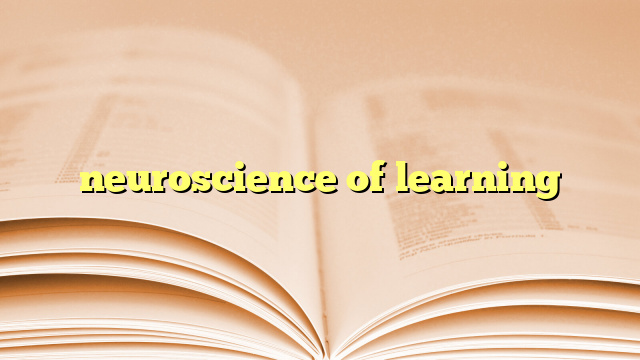Neuroscience is the study of the nervous system, especially the brain, and how it influences behavior and cognition. When it comes to learning, understanding the neuroscience behind it can provide valuable insights into how we learn and how we can improve our learning processes. In this article, we will explore the neuroscience of learning and discuss some of the key concepts and research in this field.
Neuroplasticity
One of the most important concepts in the neuroscience of learning is neuroplasticity. Neuroplasticity refers to the brain's ability to reorganize itself by forming new neural connections in response to learning or experience. This means that the brain is constantly changing and adapting based on our experiences and activities.
Neuroplasticity plays a crucial role in learning because it allows us to create new neural pathways and connections when we learn new information or skills. By engaging in activities that challenge our brain, such as learning a new language or playing a musical instrument, we can strengthen existing neural connections and create new ones, leading to improved cognitive function and learning capabilities.
Memory and Learning
Memory is another key aspect of learning that is closely tied to neuroscience. Our ability to learn and retain information is dependent on our memory systems, which are controlled by different regions of the brain. There are several types of memory, including short-term memory, long-term memory, and working memory, each of which plays a unique role in the learning process.
Research in neuroscience has shown that memory consolidation, the process of transferring information from short-term to long-term memory, is crucial for learning. By understanding how memory works and how it is influenced by factors such as attention and emotion, we can optimize our learning strategies to enhance memory retention and recall.
Attention and Focus
Attention and focus are also critical aspects of learning that are governed by the brain. The ability to pay attention to relevant information and filter out distractions is essential for effective learning. Research has shown that attention is controlled by the prefrontal cortex, a region of the brain that plays a key role in cognitive control and decision-making.
By improving our ability to focus and sustain attention, we can enhance our learning performance and productivity. Strategies such as mindfulness meditation and cognitive exercises can help train our attentional systems and improve our ability to concentrate on learning tasks.
Conclusion
The neuroscience of learning provides valuable insights into how our brain processes information and acquires new knowledge and skills. By understanding the neural mechanisms underlying learning, we can optimize our learning strategies and enhance our cognitive abilities. From neuroplasticity and memory to attention and focus, the brain plays a central role in the learning process, shaping how we perceive, retain, and apply new information. By applying principles from neuroscience to our learning practices, we can unlock our full learning potential and achieve greater success in our educational and professional pursuits.
FAQs
What is neuroplasticity?
Neuroplasticity refers to the brain's ability to reorganize itself by forming new neural connections in response to learning or experience. It is a fundamental concept in the neuroscience of learning, demonstrating the brain's capacity to adapt and change based on our experiences and activities.
How does memory influence learning?
Memory plays a crucial role in learning by storing and retrieving information for future use. Different types of memory, such as short-term memory and long-term memory, are essential for acquiring new knowledge and skills. Memory consolidation, the process of transferring information from short-term to long-term memory, is a key factor in the learning process.
What role does attention play in learning?
Attention is crucial for effective learning, as it allows us to focus on relevant information and ignore distractions. The prefrontal cortex, a region of the brain responsible for cognitive control, plays a key role in regulating attention. By improving our ability to sustain attention, we can enhance our learning performance and achieve better outcomes in educational and professional settings.
Unlock Your Mental Potential



